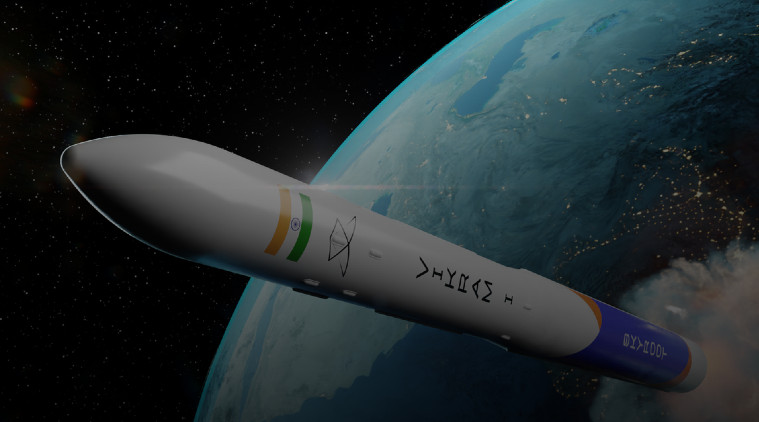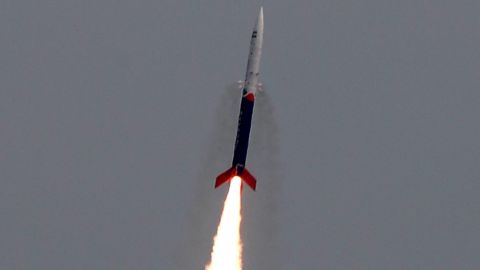Skull and Bones
ELITE MEMBER

- Joined
- Jan 29, 2011
- Messages
- 18,601
- Reaction score
- -4
- Country
- Location
India’s first privately developed rocket — Vikram-S — is set for a November 15 launch on a sub-orbital mission with three payloads, Hyderabad-based space startup Skyroot Aerospace has announced.
The maiden mission of Skyroot Aerospace, named ‘Prarambh’ (the beginning), will carry payloads of two Indian and one foreign customers and is set for launch from the Indian Space Research Organisation’s launchpad at Sriharikota.
“Heartbeats quicken. All gazes are up to the sky. The earth is listening. It all points to 15 Nov 2022 for launch,” Skyspace Aerospace said on Friday.
The launch is scheduled for 11:30 am, Skyroot Aerospace CEO and co-founder Pawan Kumar Chandana had told PTI.
Spacekidz, a Chennai-based aerospace startup, will fly ‘Fun-Sat’, a 2.5 kg payload developed by students from India, the US, Singapore and Indonesia on the sub-orbital flight on board Vikram-S.
With this mission, Skyroot is set to become the first private space company in India to launch a rocket into space, heralding a new era for the space sector which was opened up in 2020 to facilitate private sector participation.
Skyroot’s launch vehicles are named ‘Vikram’ as a tribute to the founder of the Indian space programme and renowned scientist Vikram Sarabhai.
Based in Hyderabad, Skyroot was the first startup to sign a memorandum of understanding with ISRO for launching its rockets.
It aims to disrupt entry barriers to cost-efficient satellite launch services and space-flight by advancing its mission to make spaceflights affordable, reliable and regular for all, the statement said.
Set up in 2018, Skyroot has successfully built and tested India’s first privately developed cryogenic, hypergolic-liquid, and solid fuel-based rocket engines using advanced composite and 3D-printing technologies.
Skyroot Aerospace successfully raised USD 51 million through a Series-B financing round in September this year. It had raised USD 11 million in Series-A capital raise in July last year.

 indianexpress.com
indianexpress.com
This is a suborbital flight for system validation.
The maiden mission of Skyroot Aerospace, named ‘Prarambh’ (the beginning), will carry payloads of two Indian and one foreign customers and is set for launch from the Indian Space Research Organisation’s launchpad at Sriharikota.
“Heartbeats quicken. All gazes are up to the sky. The earth is listening. It all points to 15 Nov 2022 for launch,” Skyspace Aerospace said on Friday.
The launch is scheduled for 11:30 am, Skyroot Aerospace CEO and co-founder Pawan Kumar Chandana had told PTI.
Spacekidz, a Chennai-based aerospace startup, will fly ‘Fun-Sat’, a 2.5 kg payload developed by students from India, the US, Singapore and Indonesia on the sub-orbital flight on board Vikram-S.
With this mission, Skyroot is set to become the first private space company in India to launch a rocket into space, heralding a new era for the space sector which was opened up in 2020 to facilitate private sector participation.
Skyroot’s launch vehicles are named ‘Vikram’ as a tribute to the founder of the Indian space programme and renowned scientist Vikram Sarabhai.
Based in Hyderabad, Skyroot was the first startup to sign a memorandum of understanding with ISRO for launching its rockets.
It aims to disrupt entry barriers to cost-efficient satellite launch services and space-flight by advancing its mission to make spaceflights affordable, reliable and regular for all, the statement said.
Set up in 2018, Skyroot has successfully built and tested India’s first privately developed cryogenic, hypergolic-liquid, and solid fuel-based rocket engines using advanced composite and 3D-printing technologies.
Skyroot Aerospace successfully raised USD 51 million through a Series-B financing round in September this year. It had raised USD 11 million in Series-A capital raise in July last year.

India’s first privately built rocket set for November 15 launch
Skyroot Aerospace successfully raised USD 51 million through a Series-B financing round in September this year.
This is a suborbital flight for system validation.




